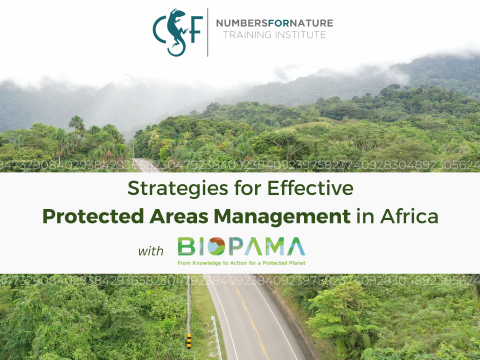Capacity Development for Protected Areas Conservation Leaders in Africa
“We need more of such courses to open our eyes on conservation matters.”
Elizabeth Atieno, Tsavo Trust, Kenya
Through September and October of 2024, Conservation Strategy Fund’s Numbers for Nature Training Institute (N4N) implemented a newly-designed online course entitled Strategies for Effective Protected Areas Management in Africa. The course was designed to provide participants with a theoretical foundation in economics and finance for conservation with a special emphasis on practical tools for financing protected areas and communicating their value to policy-makers and stakeholders. It aligns with BIOPAMA’s vision of contributing to capacity development for protected areas management and governance.
Participants were drawn from BIOPAMA and International Union for the Conservation of Nature grantees and all work on protected areas management in Africa. Ultimately, the virtual course welcomed 41 participants representing 33 different organizations and 15 countries across the African continent, including Kenya, Botswana, Madagascar, and Eswatani. This cohort included inspiring conservationists such as Raymond Cheruiyot, who leads the financing and grants operations for Kenya Wildlife Conservancies Association, and Harison Randrianasolo, a biologist for Conservation International in Madagascar. These conservationists made up an incredibly engaged cohort, all eager to enhance their ability to better integrate natural capital approaches and economic incentives into their conservation efforts.
The course staff and team of expert instructors covered topics ranging from market theory to environmental valuation and participants learned how to integrate natural capital into cost-benefit analyses to assess the best opportunities for a compromise between development and conservation.
With a solid foundation in market theory, natural resource management and conservation finance solutions, among other principles, our course participants can now expand their scope of work, identify financing opportunities, better communicate the economic value of the services protected areas provide, and support the continued conservation of the natural environment.
In review, the course participants rated the overall quality and value of the course to be 9.2 out of 10 and shared an average 98% likelihood that they would recommend this course to a colleague. Course participant Yvonne Khaemba, based in Kenya and working on policy coherence for the IUCN, shared the following response to the course: “Knowledge gained from this course has equipped me with the ability to ask better and more focused questions when discussing management of protected areas.”
Here are a couple other testimonials from this cohort:
“Taking this course has given me a deeper understanding of conservation finance principles and strategies. I've learned how to identify and implement various funding mechanisms to support conservation efforts effectively. Additionally, the course has enhanced my ability to analyze economic and environmental impacts, enabling me to make informed decisions that align with ecological sustainability and financial viability.”Frank Lihwa, Southern Tanzania Elephant Program, Tanzania
“[The] Environment is very close to my heart, so being equipped with tools to estimate its value was so helpful and intrigued my curiosity. I think this introductory course has made me want to learn even more about Conservation Finance.”
Retselisitsoe Tsolo, Ministry of Environment and Culture, Lesotho
______
The CSF Team would like to thank the European Union and the Organisation of African, Caribbean and Pacific States through the Biodiversity and Protected Area Management (BIOPAMA) Programme for their support of this course
- Log in to post comments

